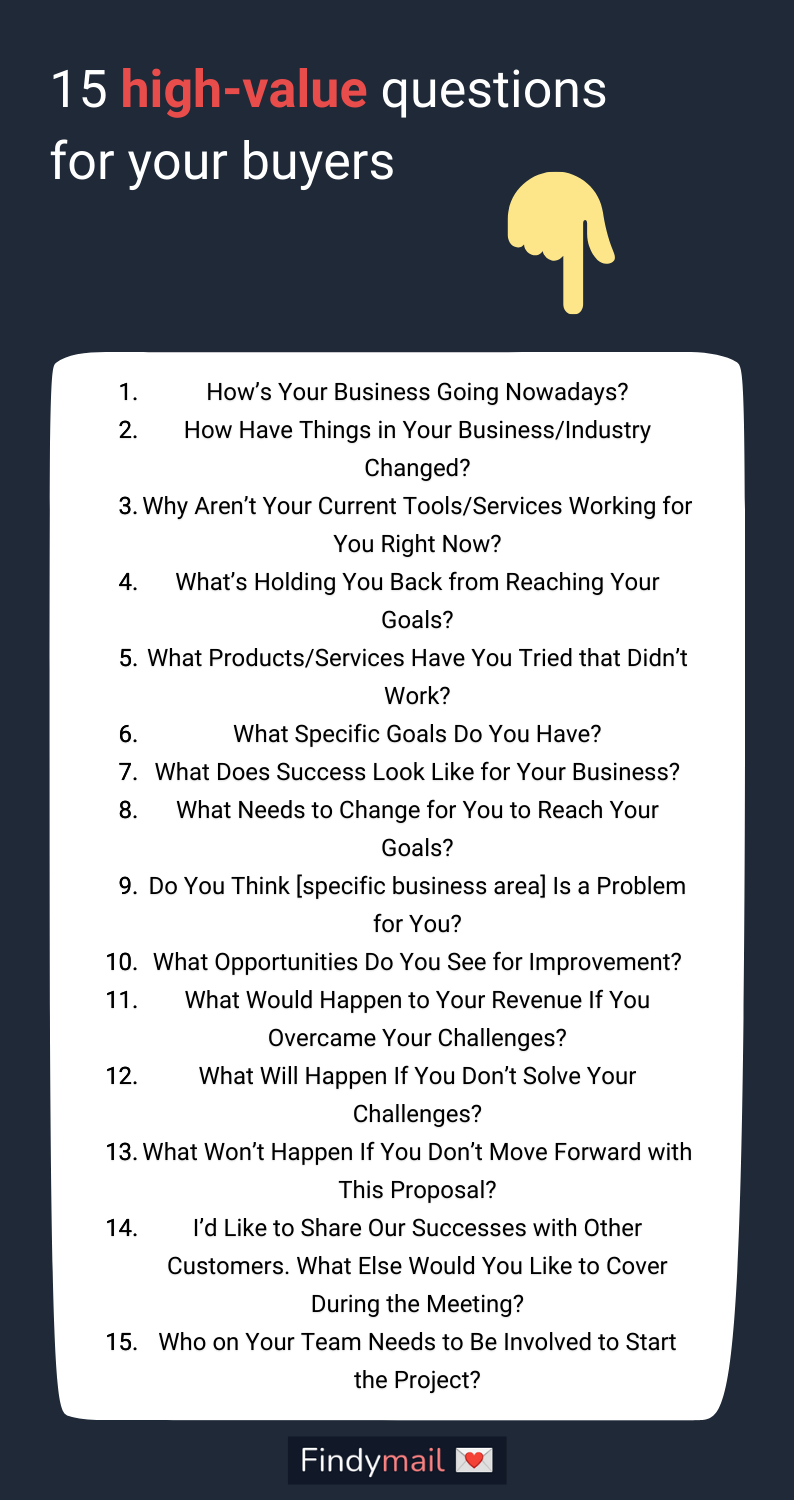The golden rule of sales is to listen more than you speak. And if you want to close more deals, you’ll need to understand what your customers want (and what they fear). There’s no better way to create a perfect proposal than to ask the right questions.
In this post, we’ll show you the 15 essential high-value questions to ask buyers. They’ll help you discover everything you need to know to improve your close rate.

1. Break the Ice with “How’s Your Business Going Nowadays?”
You don’t always know what you’re up against, especially with an inbound buyer. In this case, you need to break the ice and get deeper insights into the buyer and their business.
Allow them to go as broad as they’d like (even though most will jump straight to the point). Every piece of information they share helps you craft an image of their needs and why they’re talking to you. Not to mention that you could unlock more upselling and cross-selling opportunities.
Another benefit of this question is that it shows the buyer that your interest in their business goes further than just making a sale.
2. Show Them the Bigger Picture with “How Have Things in Your Business/Industry Changed?”
This is a great question if you’re dealing with a new industry or your business doesn’t typically deal with the buyer’s industry. Even if you’re experienced in their area, you can ask the question as a segue into a broader conversation demonstrating your expertise.
The key benefit of this high-value question to ask your B2B buyers is painting the bigger picture. As industries evolve, so do buyers’ challenges. Understand the full scope of their needs to find an ideal opportunity for your product.
P.S. If cold calling, you can put a spin on this question by referencing a specific challenge in the industry and asking your high-value buyer whether they also struggle with it.
3. “Why Aren’t Your Current Tools/Services Working for You Right Now?”
This is a perfect question to give you some insights into the products or services the buyer uses. Not only will it show you your competition, but it will also show you the challenges the buyer faces and how your products or services can solve them better than the alternatives.
4. “What’s Holding You Back from Reaching Your Goals?”
This question focuses on what challenges or obstacles prevent buyers from reaching their goals. More importantly, when you learn of these challenges, you’ll be able to show the buyer how they can overcome them by implementing the solutions you offer.
Ideally, ask questions like these early on so that the conversation between you and the buyer focuses on the solutions.
5. Key High-Value Question to Ask Buyers: “What Products/Services Have You Tried that Didn’t Work?”
Once again, this question focuses on what products or services the buyer has used that might not have solved their problem the way they wanted to.
Apart from showing you who your competition is, you’ll also be able to bridge the gap between what the buyer knows doesn’t work and your products or services (that you know do).
Feel free to use this question in an email, too. For example, if you find a highly-qualified lead’s email address on LinkedIn, get into action.
6. “What Specific Goals Do You Have?”
When asking this question, you’ll learn the buyer’s mission and goals. You’ll also get some idea of what they need to do to reach those goals, and, more importantly, it will highlight the needs or challenges the buyer hasn’t considered before.
From here, you can guide the conversation to offer solutions that meet these needs or solve these challenges.
7. “What Does Success Look Like for Your Business?”
To offer practical solutions to the buyer's problems, you should know what the buyer will consider a successful venture.
In learning this, you’ll also learn what the buyer’s goals are for their business and the relationship between you and them. This is a perfect question to gather these details. If need be, you can also extend this question to include the project's success or your working relationship to get the information you need.
(You might even get a sense of the metrics they use to evaluate success. For example, if they’re in sales, they’d use their closed-won ratio.)
8. Ask Your High-Value Buyer: “What Needs to Change for You to Reach Your Goals?”
This question is crucial in showing you the buyer’s perspective on a specific problem or challenge.
You’ll learn how they've approached their challenges, how open they’ll be to implementing your product or service, and how you can offer your products or services in the best way possible.
9. “Do You Think [specific business area] Is a Problem for You?”
With this question, you can illuminate some of the buyer's challenges by focusing on some business areas. If you learn that some areas are challenging, you can explore these areas with further questions.
If they’re not, you can also explore further, and the buyer might realize they have challenges that they’ve never considered. This is an excellent question for increasing the buyer’s awareness, especially if you have clients who struggled with the same challenge in the past (and your product helped them).
10. “What Opportunities Do You See for Improvement?”
This is a great question to outline the buyer’s goals and challenges. So, on the one hand, you’ll learn what the buyer aims to achieve, and on the other, you’ll understand their challenges and what they can improve by overcoming them.
This is a tremendous high-value question to ask buyers who you know already use a competitor or who reached out to you. They have a pressing need - they may need more guidance to illuminate it fully.
11. “What Would Happen to Your Revenue If You Overcame Your Challenges?”
Great question for revenue-driven stakeholders! Especially in marketing and sales.
Asking this question will help you illustrate the impact you can make on their business, as they’ll typically calculate how much they can gain or save by using the solutions you offer.
Bonus points if you help them calculate the savings or prove your track record by referencing other customers.
12. “What Will Happen If You Don’t Solve Your Challenges?”
With this question, you’ll focus on the buyer’s cost of inaction. In other words, you’ll help the buyer see the consequences of not implementing the solutions that can solve their problems.
This, in turn, gives some buyers the impetus to move forward with the purchasing decision.
13. “What Won’t Happen If You Don’t Move Forward with This Proposal?”
Similar to the question above, this question focuses on the buyer’s cost of inaction. The buyer probably already knows what won’t happen when they don't implement the right solutions; saying it just gives it more impact.
In turn, this serves as an encouragement to move forward.
14. “I’d Like to Share Our Successes with Other Customers. What Else Would You Like to Cover?”
You know what’s on your schedule, but your buyer might have their own. Don’t be the sales professional who asks the buyer to wait and pose questions at the end of the demo. Instead, share your plan openly and allow them to customize it.
This is the perfect question to ask to ensure that what both you and the buyer expect from the meeting is in alignment.
15. “Who on Your Team Needs to Be Involved to Start the Project?”
If your contact isn’t the buyer or a decision-maker, this is a highly-valuable question. You’ll need to determine who the decision-makers are discretely, so you can develop the right strategy to get in front of them.
If you’re dealing with an extensive B2B buyer’s journey with multiple stakeholders, this question will allow you to map out everyone you need to convince to successfully close the deal.
Asking the Right Questions Isn’t an Art - It’s a Science
If you want answers, you need to ask questions. During a sales cycle, you’ll have to pose some questions intuitively. However, these high-value questions to ask buyers will guide the way, allowing you to open up new conversations and opportunities.
Remember: the best way to close a deal is to make the buyers want to close it themselves.






